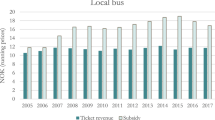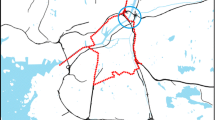Abstract
This paper examines the Singapore Area License Scheme. Changes in scheduling and choices of transportation mode by commuters are discussed. Although the toll is shown to reduce travel times for many commuters, many commuters are shown to incur scheduling costs as a result of the toll. Using estimated parameters of an indirect utility function, welfare functions are computed to compare welfare levels prior to, and just after, the toll was put into place. The evidence suggests that the toll may have reduced welfare.
Similar content being viewed by others
References
Behbehani R, Pendakur VS & Armstrong-Wright AT (1984) Singapore Area Licensing Scheme: A Review of the Impact, mimeo, The World Bank
Berglas E, Fresko D & Pines D (1984) Right of way and congestion toll. Journal of Transport Economics and Policy 18: 165–187
Brooke J (1986) There's just no end to the area's stop and go. New York Times, June 22, E-6
Dixit A (1975) The optimum factory town. Bell Journal of Economics 4: 637–651
Downs A (1962) The law of peak-hour expressway congestion. Traffic Quarterly 16: 393–409
Henderson, J.V. (1981) The economics of staggered work hours. Journal of Urban Economics 9: 349–364
Henderson JV (1985) Economic Theory and the Cities. 2nd edn. Academic Press, New York
Kendall MG (1970) Rank Correlation Methods. 4th edn. Charles Griffin & Company, Limited, London
Livesey DA (1973) Optimum city size: a minimum congestion cost approach. Journal of Economic Theory 6: 144–161
McFadden D (1974) Conditional logit analysis of qualitative choice behavior. In: Zarembka Paul (Ed) Frontiers in Econometric. Academic Press, New York
Mirrlees JA (1972) The optimum town. Swedish Journal of Economics 74: 114–135
Newman B (1976) Singapore is waging a war against cars-and it's winning. The Wall Street Journal, November 5, 1976
Oron Y, Pines D & Sheshinski E (1973) Optimum vs. equilibrium land use pattern and congestion toll. Bell Journal of Economics 4: 619–636
Pines D & Sadka E (1985) Zoning, first-best, second-best, and thrid-best criteria for allocating land for roads. Journal of Urban Economics 17: 167–183
Puu T (1978) On traffic equilibrium, congestion tolls, and the allocation of transportation capacity in a congested urban area. Environment and Planning 10A: 29–36
Rao CR (1952) Advanced Statistical Methods in Biometric Research. John Wiley and Sons, Inc., New York
Robson AJ (1976) Cost-benefit analysis and the use of urban land for transportation. Journal of Urban Economics 3: 180–191
Sen AK (1973) On the development of basic income indicators to supplement GNP measures. Economic Bulletin for Asia and the Far East 24: 1–11
Solow RM (1973) Congestion cost and the use of land for streets. Bell Journal of Economics 4: 602–618
Watson PL & Holland EP (1976) Congestion pricing-the example of Singapore. Finance and Development 13: 20–23
Watson PL & Holland EP (1978a) Relieving traffic congestion: the Singapore area license scheme. World Bank Staff working paper No. 281, Washington
Watson PL & Holland EP (1978b) Traffic restraint in Singapore. Traffic Engineering and Control 19: 14–22
Wilson PW (1986) Income variation, the value of travel time, and implicit scheduling costs in staggered work hours equilibria. Unpublished Ph.D. dissertation, Brown University
Author information
Authors and Affiliations
Rights and permissions
About this article
Cite this article
Wilson, P.W. Welfare effects of congestion pricing in Singapore. Transportation 15, 191–210 (1988). https://doi.org/10.1007/BF00837581
Issue Date:
DOI: https://doi.org/10.1007/BF00837581




